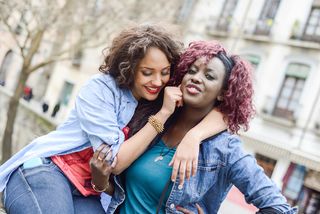
Health
Can Romance Protect the Mental Health of LGBT Youth?
A new study suggests it can.
Posted May 29, 2018
Even with increasing social acceptance in recent years, people who identify as Lesbian, Gay, Bisexual, or Transgender (LGBT) still experience prejudice, discrimination, and victimization because of their sexual orientation. For LGBT youth, bullying by peers and rejection by family members are common. Not surprisingly, this often leads to psychological distress and mental health issues like depression.
Along with many others, I am interested in finding ways to promote positive mental health among LGBT youth. And in a recent study published in the Journal of Abnormal Psychology, I found that romance – that is, being in a romantic relationship – may be one factor that can protect LGBT youth from the negative psychological effects of victimization.
For this paper, I (along with colleagues Christina Dyar and Michael Newcomb), used data from Project Q2, conducted by Brian Mustanski, Director of Northwestern University’s Institute for Sexual and Gender Minority Health and Wellbeing. In Project Q2, 248 LGBT youth were interviewed 8 times over 5 years, starting when they were 16-20 years old. At each interview, youth reported on whether or not they were in a romantic relationship, the amount of victimization they had experienced due to being LGBT, and their level of psychological distress.
We found two important things:

First, lesbian and gay youth were less psychologically distressed at times when they were in a romantic relationship than at times when they were single. This was particularly true for Black and Latino youth—which is very important since LGBT people of color face significant challenges due to being both sexual and racial minorities. However, it was not true for bisexual youth (more on that, below).
Second, for all youth in the study, being in a romantic relationship reduced the negative psychological effects of LGBT-related victimization. Let me explain that further. When youth were single, the more bullying, threats, and violence they experienced because of their sexual orientation, the more distressed they were likely to be. However, when youth were dating someone, victimization was no longer associated with psychological distress.
Together, these results are exciting because they suggest that romantic relationships can help many LGBT youths feel less emotionally distressed. Not only does dating someone appear to promote psychological well-being for gay and lesbian youth overall, but it also can buffer them from the hurtful effects of being bullied or otherwise victimized. We didn’t explore exactly how this buffering effect plays out, but it is likely that youth receive emotional comfort and social support from their romantic partner to help cope when bad things happen.
The results fit with the well-known positive psychological effects of marriage for heterosexual adults—getting married tends to make people healthier and happier. But before this study, it wasn’t clear if gay and lesbian people would get the same benefits from romantic relationships, especially since same-sex relationships often do not involve the same financial and legal benefits as marriage and are not always accepted by others. The findings also help to dispel negative myths about LGBT relationships, which have historically been portrayed as unhealthy.
One big caveat is that the benefits of romance were not seen for bisexual youth. In fact, bisexual participants were more distressed – not less distressed – when they were in a relationship than when they were single. It is not clear why this was the case, but it might be related to how bisexuals are often told, by both heterosexual and gay and lesbian people, that their bisexuality is not a “real” sexual orientation, or is only a temporary phase. Sometimes entering a relationship can make this worse, because people (including the partner) assume that the bisexual person is now heterosexual or gay/lesbian based on the gender of their partner. Bisexual individuals also face negative stereotypes, such as being unable to commit to one partner and sexually promiscuous. They may face such stereotypes more when they start dating someone.
Overall, though, the results indicate that dating is often a positive experience for gay and lesbian youth that can help them manage the stressors associated with being a sexual minority. In my view, this means we should develop and support initiatives to promote involvement in healthy relationships among LGBT youth. Efforts to encourage dating among LGBT youth (e.g., through planned LGBT-focused social events like Gay Prom) and to teach healthy relationship skills hold some promise for reducing the mental health disparities they face.
If you’re interested, check out the coverage of this study by The Washington Post.



